As summer winds down, it's time to take advantage of seasonal fruit and stockpile for the winter! Check out these failproof tips for enjoying summer fruit year round.
Makes as much fruit as you have space for
There's not much better in the world than a juicy, ripe piece of fruit. During the summer months, I engorge myself with fresh summer fruit: plump strawberries, luscious mango, tart raspberries and sinisterly sweet blackberries. As winter approaches and the vibrant displays fade from the markets, I begin to crave the burst of juicy sunshine of a fresh summer berry.
One of the most common ways to preserve fruit is to can it, but this isn't a method I find very fun. The thought of sterilizing jars is pretty unappealing. Plus, in my compact kitchen with only 6 cupboards (5 accessible at all times) and 5 drawers, space is a valuable commodity. Taking into account my disdain for the multi-level process of canning, the lack of storage and my general impatience and affinity for ease over fuss, I'm a fruit freezer. All the way.
Whether you're a stalwart canner, clinking your glass jars and fiddling with Mason lids for days or if you've got a little bit of a love affair going on with your freezer, preserving fruit is a smart economic move to make. With global export and import at our fingertips, we're able to enjoy out of season fruit and vegetables pretty much around the clock.
{I'm always shocked when we go to the grocery store to pick up fruits and vegetables that have come from the far reaches of Africa and South America, Cuba and the Middle East. In the States, our importing isn't as broad as it is here in the UK. Growing up, you'd look at a Jamaican yam and feel overly exotic, amazed that food would travel that far just to be candied, sprinkled with cinnamon and served alongside mom's pot roast.}
Our demand for certain fruits even when they're out of season (take bananas, for instance) means humans have had to get pretty smart in import and export. You'll notice, no doubt, that when in season, fruits and vegetables are far cheaper than when out of season. Even the price of bananas, staple of so many international cuisines as they are, creeps up slightly in winter.
And don't even think about buying a punnet of late season strawberries! Here in the UK, when the strawberry crop is plentiful in summer, you can get buckets of them for a quid or two. As soon as there's a hint of autumn and the days get shorter, the price skyrockets. And please, don't think about making a strawberry dessert for Valentine's Day unless you're willing to pay enough pennies to feed a small village. Strawberry prices creep up further still in February. It's all us lovesick bakers whipping up desserts for our partners or naughty bedroom games of strawberries and chocolate...
When you preserve by canning, you need a whole list of ingredients and items. Doing a search for a random recipe for canning blueberries suggests you'd need: pots, spoons and ladles, canners, jars, funnels, lids and rings...and we haven't even gotten to the edible stuff! For that, you'll need some blueberries, lemon juice and sugar. Not too many ingredients, but why add sugar to already sweet fruit? Freezing locks in the fruit's sweetness, there's no added sugar and if it's done properly, will last just as long as anything canned. If not longer!
Okay, then, let me show you how to freeze fruit properly:
fresh blueberries
For the kiwi
fresh kiwi, peeled and sliced
For the strawberries
fresh strawberries, sliced
For the bananas
ripe bananas, sliced
1. For berries and soft fruit without thick skins, wash the fruit and shake to dry or pat dry, if you're really fussy.
2. Arrange the fruit in a single layer on a greaseproof paper lined baking sheet that will fit into your freezer. Make sure that none of the fruit is touching! This is the key step!
If your fruit isn't touching when you first freeze it, it won't stick together when you put it in a bag or container for long-term storage.

3. Freeze the fruit on the baking sheet until it is frozen solid and when dropped on a counter sounds the way ice would sound. My freezer has a built-in fast freeze option that freezes things in about half the time normally required. With that setting switched on, I'd say it takes about 3 hours to fully freeze large berries.
4. When the fruit is ready, simply lift up the greasproof paper from the baking tray, fold two ins together to make a funnel and shake the frozen fruit (which should just roll off the paper with a bit of jiggling) into a zip-seal bag or plastic container.
5. Return to the freezer and use as needed.
6. For fruit with thick, inedible skins such as bananas and kiwi, remove the skins, slice and then repeat steps 2 through 4.
7. For fruit with thin, edible skins like plums, peaches and pears, you can choose to freeze with the skin off or on. Just follow the steps accordingly.
The results and benefits of freezing:
Makes as much fruit as you have space for
There's not much better in the world than a juicy, ripe piece of fruit. During the summer months, I engorge myself with fresh summer fruit: plump strawberries, luscious mango, tart raspberries and sinisterly sweet blackberries. As winter approaches and the vibrant displays fade from the markets, I begin to crave the burst of juicy sunshine of a fresh summer berry.
One of the most common ways to preserve fruit is to can it, but this isn't a method I find very fun. The thought of sterilizing jars is pretty unappealing. Plus, in my compact kitchen with only 6 cupboards (5 accessible at all times) and 5 drawers, space is a valuable commodity. Taking into account my disdain for the multi-level process of canning, the lack of storage and my general impatience and affinity for ease over fuss, I'm a fruit freezer. All the way.
Whether you're a stalwart canner, clinking your glass jars and fiddling with Mason lids for days or if you've got a little bit of a love affair going on with your freezer, preserving fruit is a smart economic move to make. With global export and import at our fingertips, we're able to enjoy out of season fruit and vegetables pretty much around the clock.
{I'm always shocked when we go to the grocery store to pick up fruits and vegetables that have come from the far reaches of Africa and South America, Cuba and the Middle East. In the States, our importing isn't as broad as it is here in the UK. Growing up, you'd look at a Jamaican yam and feel overly exotic, amazed that food would travel that far just to be candied, sprinkled with cinnamon and served alongside mom's pot roast.}
Our demand for certain fruits even when they're out of season (take bananas, for instance) means humans have had to get pretty smart in import and export. You'll notice, no doubt, that when in season, fruits and vegetables are far cheaper than when out of season. Even the price of bananas, staple of so many international cuisines as they are, creeps up slightly in winter.
And don't even think about buying a punnet of late season strawberries! Here in the UK, when the strawberry crop is plentiful in summer, you can get buckets of them for a quid or two. As soon as there's a hint of autumn and the days get shorter, the price skyrockets. And please, don't think about making a strawberry dessert for Valentine's Day unless you're willing to pay enough pennies to feed a small village. Strawberry prices creep up further still in February. It's all us lovesick bakers whipping up desserts for our partners or naughty bedroom games of strawberries and chocolate...
When you preserve by canning, you need a whole list of ingredients and items. Doing a search for a random recipe for canning blueberries suggests you'd need: pots, spoons and ladles, canners, jars, funnels, lids and rings...and we haven't even gotten to the edible stuff! For that, you'll need some blueberries, lemon juice and sugar. Not too many ingredients, but why add sugar to already sweet fruit? Freezing locks in the fruit's sweetness, there's no added sugar and if it's done properly, will last just as long as anything canned. If not longer!
Okay, then, let me show you how to freeze fruit properly:
Ingredients:
For the blueberriesfresh blueberries
For the kiwi
fresh kiwi, peeled and sliced
For the strawberries
fresh strawberries, sliced
For the bananas
ripe bananas, sliced
Instructions:
How to Preserve Fruit for Winter without Canning1. For berries and soft fruit without thick skins, wash the fruit and shake to dry or pat dry, if you're really fussy.
2. Arrange the fruit in a single layer on a greaseproof paper lined baking sheet that will fit into your freezer. Make sure that none of the fruit is touching! This is the key step!

3. Freeze the fruit on the baking sheet until it is frozen solid and when dropped on a counter sounds the way ice would sound. My freezer has a built-in fast freeze option that freezes things in about half the time normally required. With that setting switched on, I'd say it takes about 3 hours to fully freeze large berries.
4. When the fruit is ready, simply lift up the greasproof paper from the baking tray, fold two ins together to make a funnel and shake the frozen fruit (which should just roll off the paper with a bit of jiggling) into a zip-seal bag or plastic container.
5. Return to the freezer and use as needed.
6. For fruit with thick, inedible skins such as bananas and kiwi, remove the skins, slice and then repeat steps 2 through 4.
7. For fruit with thin, edible skins like plums, peaches and pears, you can choose to freeze with the skin off or on. Just follow the steps accordingly.
The results and benefits of freezing:
No dishes to wash!
Your kitchen won't look like a science lab with jars and beakers, jar holders and thermometers.
Fruit that is easy to store and is convenient for using in small or large quantities. For instance, when I want to make a smoothie, I head to my freezer and pull out handfuls of whatever fruit I'd like to use. Because of the way it was frozen, the fruit isn't stuck together. Also, frozen fruit in smoothies eliminates the need for ice.
Freezing your fruit instead of canning it means you won't be stuck with 8 million jars of jam. Now, I love homemade jam, but there's only so much you can eat.
When everyone is taking out a second mortgage just to get fruit out of season, you'll be able to invite them over and console them with a strawberry pie using fresh, perfectly ripe berries. In November. Try not to be too smug, though.
Fall's coming! Next week, in fact! Be prepared:


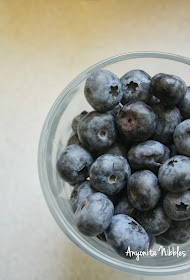
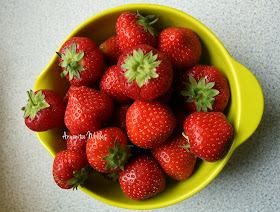




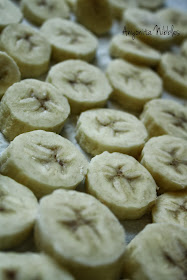
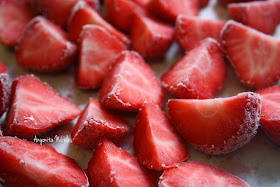
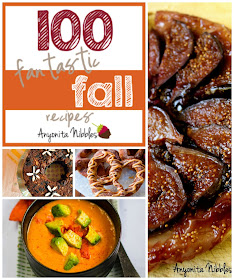










No Comments Yet, Leave Yours!
Post a Comment
What do you think of this recipe? Be sure to tag me in any recipes you make on social media and use #anyonitanibbles!